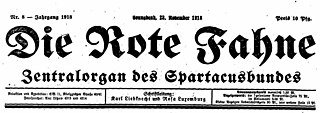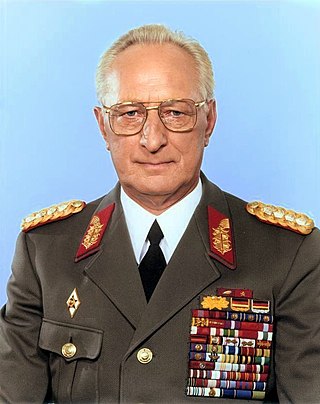
Beate Auguste Klarsfeld is a Franco-German journalist and Nazi hunter who, along with her French husband, Serge, became famous for their investigation and documentation of numerous Nazi war criminals, including Kurt Lischka, Alois Brunner, Klaus Barbie, Ernst Ehlers and Kurt Asche.

Margot Honecker was an East German politician and influential member of the country's Communist government until 1989. From 1963 until 1989, she was Minister of National Education of the German Democratic Republic (GDR). She was married to Erich Honecker, leader of East Germany's ruling Socialist Unity Party from 1971 to 1989 and concurrently from 1976 to 1989 the country's head of state.

Walter Jens was a German philologist, literature historian, critic, university professor and writer.

Die Rote Fahne was a German newspaper originally founded in 1876 by Socialist Worker's Party leader Wilhelm Hasselmann, and which has been since published on and off, at times underground, by German Socialists and Communists. Karl Liebknecht and Rosa Luxemburg famously published it in 1918 as organ of the Spartacus League.

Heinz Keßler was a German communist politician and military officer in East Germany.

Karl-Heinz Kurras was a West German police inspector, known primarily for fatally shooting unarmed student Benno Ohnesorg in the back of the head during a demonstration on 2 June 1967, outside Deutsche Oper against the state visit of Mohammad Reza Pahlavi, the last Shah of Iran. Kurras was acquitted of any wrongdoing in a series of controversial trials, due to which he became a prominent hate figure of the left-wing German student movement of the 1960s as well as the German New Left. They suspected that Kurras was under protection from many right-wing figures in the West German police and justice system and who were resentful towards the left-wing students. The incident is considered pivotal for the rise of left-wing terrorism in West Germany during the 1970s, culminating with the Movement 2 June and the Red Army Faction.
Werner Spies is a German art historian, journalist and exhibition organizer. From 1997 to 2000, he was a director of the Centre Georges Pompidou in Paris. Klaus Albrecht Schröder, director of the Albertina in Vienna, has called Spies "one of the most influential art historians of the 20th century."
Befehlsnotstand is a German legal term that refers to a situation in which a certain action is ordered that violates law, but where the refusal to carry out such an order would lead to drastic consequences, specifically danger to life or body, for the person refusing to carry out the order.
An unofficial collaborator or IM, or euphemistically informal collaborator, was an informant in the German Democratic Republic who delivered private information to the Ministry for State Security. At the end of the East German government, there was a network of around 189,000 informants, working at every level of society.

Mathias Gnädinger was a Swiss stage and film actor.
The Tower is a 2012 German TV drama film based on the eponymous 2008 novel by Uwe Tellkamp. It is about life and history in Dresden between 1982 and 1989 in the German Democratic Republic, GDR and its last years before demonstrations, the time of Die Wende, the tearing down of the wall and before German reunification.
The Bundeswehr Centre of Military History and Social Sciences is a German research institution focused on military history and social sciences. Located in Potsdam, it is a part of Germany's Federal Ministry of Defence. The organisation was formed in 2013 by merging the Military History Research Office (MGFA) and the Bundeswehr Institute of Social Sciences.
Wilhelm Deist (1931–2003) was a German historian and author who specialised in the European history of 19th and 20th with an emphasis on the history of World War I. Deist was senior historian at the Military History Research Office (MGFA) and honorary professor at the University of Freiburg. Deist was a widely published author and a chief editor of the seminal series Germany and the Second World War from the MGFA.
Sven Felix Kellerhoff is a German historian, journalist and author who specialises in the history of the Nazi era.
Magnus Brechtken is a German historian. He is the deputy director of the Institute of Contemporary History in Munich and teaches at the Ludwig Maximilians University in Munich. In 2017 he wrote a biographical study of Albert Speer which won the 2017 NDR Culture Award for Non-fiction.
Matthias Paul is a German actor, singer and director.

Lorenz Kienzle is a German photographer. He has been living in Berlin since 1991.

The Lübschützer Teiche Bunker Complex, built 1968–1972, was designed to be an emergency command centre for the District Administration for State Security, Leipzig in the event of war or a nuclear attack. It was never used for its intended purpose.

The Wirmer Flag, also known commercially as the flag of German Resistance 20 July or the Stauffenberg flag, is a design by Josef Wirmer. Wirmer was a resistance fighter against the Nazi Regime and part of the 20 July plot. According to his idea, the flag was to become the new flag of Germany after the successful assassination attempt against Hitler and the transfer of power to the conspirators. First discussed by the Parlamentarischer Rat in 1948/49 as the federal flag, the design served in modified form as the party flag of the Christian Democratic Union of Germany (CDU) from 1953 until around 1970 and as the model for the Free Democratic Party's (FDP) party symbol. The flag then disappeared from public perception.

As a country with traditionally strong contacts in the Arab world, Germany enjoys a good relationship with Kuwait. Among the EU states, Germany is Kuwait's most important trading partner.











